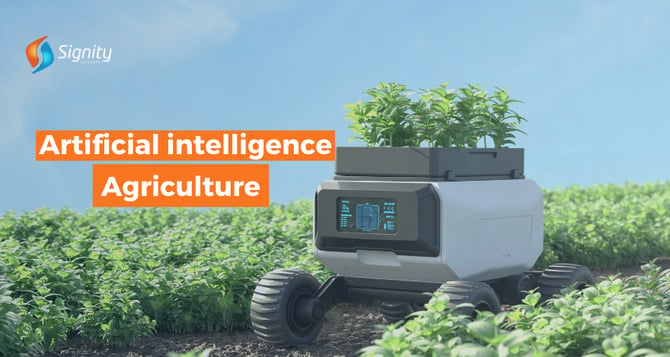AI in Agriculture: Transforming Modern Farming
AI is transforming agriculture by enhancing precision farming, automating labor, and improving crop management through predictive analytics. From AI-powered drones to automated irrigation, these innovations boost efficiency and sustainability, shaping the future of modern farming.

The integration of artificial intelligence (AI) in agriculture is revolutionizing the way farming is conducted. From precision agriculture to predictive analytics, AI-driven solutions are helping farmers increase productivity, reduce costs, and promote sustainability. As we look toward the future, the potential of AI in agriculture continues to grow, offering innovative ways to tackle challenges in the industry.
The Role of AI in Agriculture
The application of AI in agriculture ranges from monitoring crops to automating labor-intensive tasks. By leveraging technologies like machine learning, computer vision, and robotics, AI development in the agricultural sector is transforming traditional farming methods. Here are some ways AI is reshaping agriculture:
1. Precision Farming
AI-powered precision farming allows farmers to use data-driven insights to make more accurate decisions about crop management. Drones and sensors collect data on soil conditions, moisture levels, and crop health, which AI algorithms analyze to optimize the use of resources like water and fertilizers. This ensures higher yields with minimal waste.
2. Automated Irrigation Systems
AI-driven irrigation systems can adjust water distribution based on real-time data from the fields. By using predictive analytics and weather forecasting, these systems ensure that crops receive the optimal amount of water, reducing water wastage and enhancing crop health.
3. AI-powered drones and Robotics
Drones equipped with AI technology can monitor large agricultural fields, providing detailed insights into crop conditions. Robots, on the other hand, are used to automate labor-intensive tasks such as planting, weeding, and harvesting. These innovations help reduce manual labor costs and increase efficiency.
4. Predictive Analytics for Better Crop Management
AI helps farmers predict future outcomes by analyzing historical data and real-time inputs like weather conditions, soil quality, and market trends. This allows them to make informed decisions about what crops to plant when to harvest, and how to manage pests and diseases, minimizing risk and maximizing profit.
5. Pest and Disease Control
AI-based systems can detect early signs of pests or diseases in crops by analyzing images and sensor data. This early detection allows farmers to take timely action, reducing the use of chemical pesticides and protecting the environment.
The Future of AI in Agriculture
As AI development progresses, its role in agriculture will become even more significant. Autonomous tractors, AI-enabled vertical farming, and AI-based supply chain optimization are just a few innovations on the horizon. These technologies not only improve efficiency but also address key challenges like food security, climate change, and resource scarcity.
The future of farming will rely heavily on AI solutions that are sustainable, efficient, and scalable. By continuing to invest in AI in agriculture, we can build a more resilient and productive food system for generations to come.
Conclusion
AI is undoubtedly shaping the future of farming by providing advanced tools to help farmers overcome traditional challenges. From precision farming to predictive analytics, the integration of AI in agriculture is driving efficiency, sustainability, and innovation.
Step Into the Future of Agriculture!
Discover how AI can revolutionize your farming practices. Reach out now for a consultation and start your journey toward smarter farming!
As AI development continues to evolve, its potential to transform the agricultural sector will only grow, offering a promising future for farmers worldwide.



.png?width=344&height=101&name=Mask%20group%20(5).png)
















